Federalism Obj #2
The document outlines the powers delegated to the national government, powers denied to the national government, powers reserved for state governments, and powers denied to state governments according to the US Constitution. The national government has the power to print currency, declare war, establish military forces, enter treaties, regulate interstate commerce, establish post offices, and make laws to enforce the Constitution. However, it cannot violate civil liberties, impose certain taxes, spend without Congressional approval, or alter state borders. State governments can establish local entities, issue licenses, regulate intrastate commerce, conduct elections, and manage unspecified powers within their jurisdiction, but cannot make treaties, print currency, tax imports/exports, or impair contracts. Neither level of government can
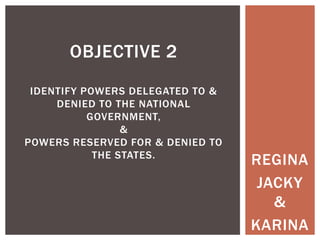
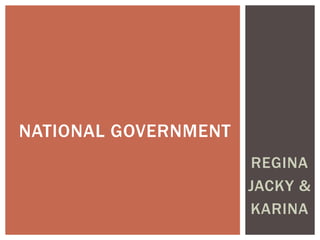
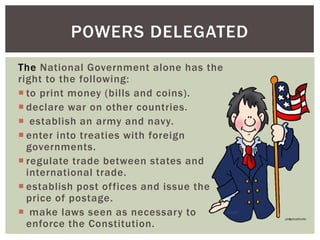
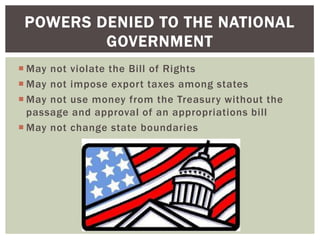
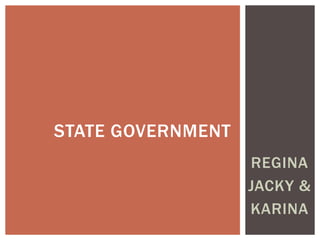
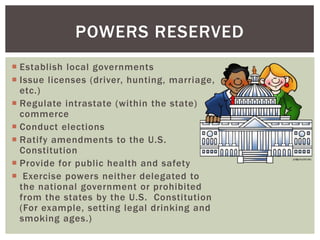
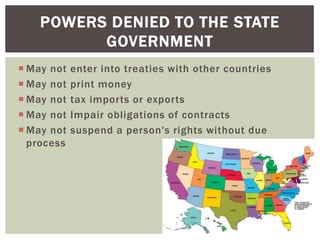
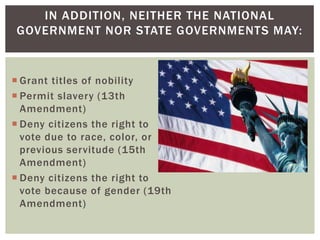
Recommended
More Related Content
What's hot (16)
Recently uploaded (20)
Federalism Obj #2
- 1. OBJECTIVE 2 IDENTIFY POWERS DELEGATED TO & DENIED TO THE NATIONAL GOVERNMENT, & POWERS RESERVED FOR & DENIED TO THE STATES. REGINA JACKY & KARINA
- 3. POWERS DELEGATED The National Government alone has the right to the following: ’éĪ to print money (bills and coins). ’éĪ declare war on other countries. ’éĪ establish an army and navy. ’éĪ enter into treaties with foreign governments. ’éĪ regulate trade between states and international trade. ’éĪ establish post offices and issue the price of postage. ’éĪ make laws seen as necessary to enforce the Constitution.
- 4. POWERS DENIED TO THE NATIONAL GOVERNMENT ’éĪ May not violate the Bill of Rights ’éĪ May not impose export taxes among states ’éĪ May not use money from the Treasury without the passage and approval of an appropriations bill ’éĪ May not change state boundaries
- 6. POWERS RESERVED ’éĪ Establish local governments ’éĪ Issue licenses (driver, hunting, marriage, etc.) ’éĪ Regulate intrastate (within the state) commerce ’éĪ Conduct elections ’éĪ Ratify amendments to the U.S. Constitution ’éĪ Provide for public health and safety ’éĪ Exercise powers neither delegated to the national government or prohibited from the states by the U.S. Constitution (For example, setting legal drinking and smoking ages.)
- 7. POWERS DENIED TO THE STATE GOVERNMENT ’éĪ May not ’éĪ May not ’éĪ May not ’éĪ May not ’éĪ May not process enter into treaties with other countries print money tax imports or exports Impair obligations of contracts suspend a person's rights without due
- 8. IN ADDITION, NEITHER THE NATIONAL GOVERNMENT NOR STATE GOVERNMENTS MAY: ’éĪ Grant titles of nobility ’éĪ Permit slavery (13th Amendment) ’éĪ Deny citizens the right to vote due to race, color, or previous servitude (15th Amendment) ’éĪ Deny citizens the right to vote because of gender (19th Amendment)
